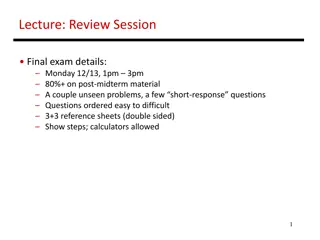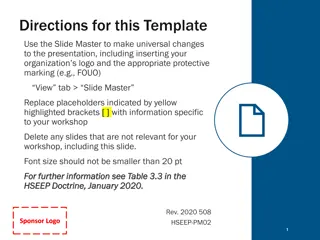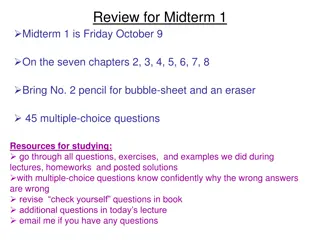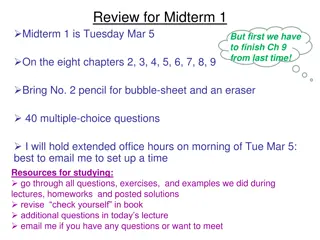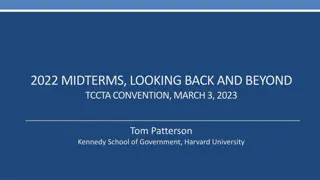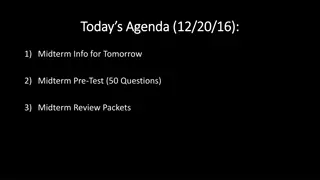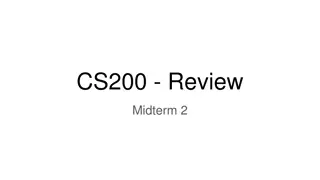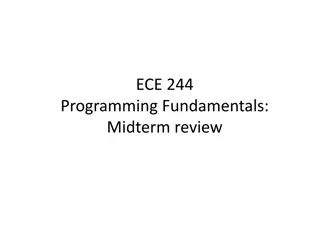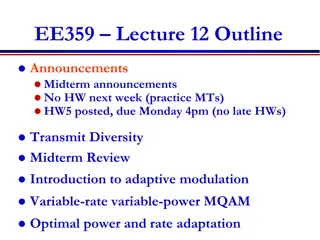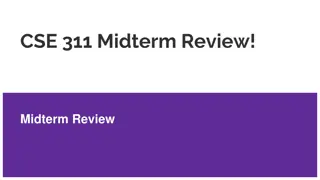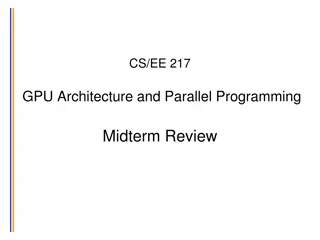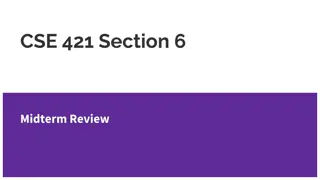
Midterm Slides Review: Reasoning About Code and Concepts
Dive into the midterm slides by Vinod Rathnam and Geoffrey Liu covering topics like reasoning about code, subtypes, classes, assertions, and more. Learn to find weakest preconditions, and explore abstract data types and testing in this comprehensive review.
Uploaded on | 0 Views
Download Presentation

Please find below an Image/Link to download the presentation.
The content on the website is provided AS IS for your information and personal use only. It may not be sold, licensed, or shared on other websites without obtaining consent from the author. If you encounter any issues during the download, it is possible that the publisher has removed the file from their server.
You are allowed to download the files provided on this website for personal or commercial use, subject to the condition that they are used lawfully. All files are the property of their respective owners.
The content on the website is provided AS IS for your information and personal use only. It may not be sold, licensed, or shared on other websites without obtaining consent from the author.
E N D
Presentation Transcript
Section 7: Midterm Slides by Vinod Rathnam and Geoffrey Liu (with material from Alex Mariakakis, Kellen Donohue, David Mailhot, and Hal Perkins)
Midterm topics Reasoning about code Subtypes & subclasses Specification vs. Implementation Exceptions & assertions Abstract Data Types (ADTs) Identity & equality Testing
Reasoning about code 1 Using backwards reasoning, find the weakest precondition for each sequence of statements and postcondition below. Insert appropriate assertions in each blank line. You should simplify your answers if possible. {_______________} z = x + y; {_______________} y = z 3; {x > y}
Reasoning about code 1 Using backwards reasoning, find the weakest precondition for each sequence of statements and postcondition below. Insert appropriate assertions in each blank line. You should simplify your answers if possible. {_______________} z = x + y; {x > z 3} y = z 3; {x > y}
Reasoning about code 1 Using backwards reasoning, find the weakest precondition for each sequence of statements and postcondition below. Insert appropriate assertions in each blank line. You should simplify your answers if possible. {x > x + y 3 => y < 3} z = x + y; {x > z 3} y = z 3; {x > y}
Reasoning about code 1 Using backwards reasoning, find the weakest precondition for each sequence of statements and postcondition below. Insert appropriate assertions in each blank line. You should simplify your answers if possible. {_______________} p = a + b; {_______________} q = a - b; {p + q = 42}
Reasoning about code 1 Using backwards reasoning, find the weakest precondition for each sequence of statements and postcondition below. Insert appropriate assertions in each blank line. You should simplify your answers if possible. {_______________} p = a + b; {p + a - b = 42} q = a - b; {p + q = 42}
Reasoning about code 1 Using backwards reasoning, find the weakest precondition for each sequence of statements and postcondition below. Insert appropriate assertions in each blank line. You should simplify your answers if possible. {a + b + a b = 42 a = 21} p = a + b; {p + a - b = 42} q = a - b; {p + q = 42}
Specification vs. Implementation Suppose we have a BankAccount class with instance variable balance. Consider the following specifications: A. @effects decreases balance by amount B. @requires amount >= 0 and amount <= balance @effects decreases balance by amount C. @throws InsufficientFundsException if balance < amount @effects decreases balance by amount Another way to ask the question: Another way to ask the question: Which specifications does this implementation meet? If the client does not know the If the client does not know the implementation, will the method implementation, will the method do what the client expects it to do what the client expects it to do based on the specification? do based on the specification? I. void withdraw(int amount) { balance -= amount; }
Specification vs. Implementation Suppose we have a BankAccount class with instance variable balance. Consider the following specifications: does exactly what the spec says A. @effects decreases balance by amount B. @requires amount >= 0 and amount <= balance @effects decreases balance by amount C. @throws InsufficientFundsException if balance < amount @effects decreases balance by amount Which specifications does this implementation meet? I. void withdraw(int amount) { balance -= amount; }
Specification vs. Implementation Suppose we have a BankAccount class with instance variable balance. Consider the following specifications: does exactly what the spec says A. @effects decreases balance by amount If the client follows the @requires precondition, the code will execute as expected B. @requires amount >= 0 and amount <= balance @effects decreases balance by amount C. @throws InsufficientFundsException if balance < amount @effects decreases balance by amount Which specifications does this implementation meet? I. void withdraw(int amount) { balance -= amount; }
Specification vs. Implementation Suppose we have a BankAccount class with instance variable balance. Consider the following specifications: does exactly what the spec says A. @effects decreases balance by amount If the client follows the @requires precondition, the code will execute as expected B. @requires amount >= 0 and amount <= balance @effects decreases balance by amount C. @throws InsufficientFundsException if balance < amount @effects decreases balance by amount Method never throws an exception Which specifications does this implementation meet? I. void withdraw(int amount) { balance -= amount; }
Specification vs. Implementation Suppose we have a BankAccount class with instance variable balance. Consider the following specifications: A. @effects decreases balance by amount B. @requires amount >= 0 and amount <= balance @effects decreases balance by amount C. @throws InsufficientFundsException if balance < amount @effects decreases balance by amount Which specifications does this implementation meet? II. void withdraw(int amount) { if (balance >= amount) balance -= amount; }
Specification vs. Implementation Suppose we have a BankAccount class with instance variable balance. Consider the following specifications: balance does not always decrease A. @effects decreases balance by amount B. @requires amount >= 0 and amount <= balance @effects decreases balance by amount C. @throws InsufficientFundsException if balance < amount @effects decreases balance by amount Which specifications does this implementation meet? II. void withdraw(int amount) { if (balance >= amount) balance -= amount; }
Specification vs. Implementation Suppose we have a BankAccount class with instance variable balance. Consider the following specifications: balance does not always decrease A. @effects decreases balance by amount If the client follows the @requires precondition, the code will execute as expected B. @requires amount >= 0 and amount <= balance @effects decreases balance by amount C. @throws InsufficientFundsException if balance < amount @effects decreases balance by amount Which specifications does this implementation meet? II. void withdraw(int amount) { if (balance >= amount) balance -= amount; }
Specification vs. Implementation Suppose we have a BankAccount class with instance variable balance. Consider the following specifications: balance does not always decrease A. @effects decreases balance by amount If the client follows the @requires precondition, the code will execute as expected B. @requires amount >= 0 and amount <= balance @effects decreases balance by amount C. @throws InsufficientFundsException if balance < amount @effects decreases balance by amount Method never throws an exception Which specifications does this implementation meet? II. void withdraw(int amount) { if (balance >= amount) balance -= amount; }
Specification vs. Implementation Suppose we have a BankAccount class with instance variable balance. Consider the following specifications: A. @effects decreases balance by amount B. @requires amount >= 0 and amount <= balance @effects decreases balance by amount C. @throws InsufficientFundsException if balance < amount @effects decreases balance by amount Which specifications does this implementation meet? III.void withdraw(int amount) { if (amount < 0) throw new IllegalArgumentException(); balance -= amount; }
Specification vs. Implementation Suppose we have a BankAccount class with instance variable balance. Consider the following specifications: balance does not always decrease A. @effects decreases balance by amount B. @requires amount >= 0 and amount <= balance @effects decreases balance by amount C. @throws InsufficientFundsException if balance < amount @effects decreases balance by amount Which specifications does this implementation meet? III.void withdraw(int amount) { if (amount < 0) throw new IllegalArgumentException(); balance -= amount; }
Specification vs. Implementation Suppose we have a BankAccount class with instance variable balance. Consider the following specifications: balance does not always decrease A. @effects decreases balance by amount If the client follows the @requires precondition, the code will execute as expected B. @requires amount >= 0 and amount <= balance @effects decreases balance by amount C. @throws InsufficientFundsException if balance < amount @effects decreases balance by amount Which specifications does this implementation meet? III.void withdraw(int amount) { if (amount < 0) throw new IllegalArgumentException(); balance -= amount; }
Specification vs. Implementation Suppose we have a BankAccount class with instance variable balance. Consider the following specifications: balance does not always decrease A. @effects decreases balance by amount If the client follows the @requires precondition, the code will execute as expected B. @requires amount >= 0 and amount <= balance @effects decreases balance by amount C. @throws InsufficientFundsException if balance < amount @effects decreases balance by amount Method throws wrong exception for wrong reason Which specifications does this implementation meet? III.void withdraw(int amount) { if (amount < 0) throw new IllegalArgumentException(); balance -= amount; }
Specification vs. Implementation Suppose we have a BankAccount class with instance variable balance. Consider the following specifications: A. @effects decreases balance by amount B. @requires amount >= 0 and amount <= balance @effects decreases balance by amount C. @throws InsufficientFundsException if balance < amount @effects decreases balance by amount Which specifications does this implementation meet? IV. void withdraw(int amount) throws InsufficientFundsException { if (balance < amount) throw new InsufficientFundsException(); balance -= amount; }
Specification vs. Implementation Suppose we have a BankAccount class with instance variable balance. Consider the following specifications: balance does not always decrease A. @effects decreases balance by amount B. @requires amount >= 0 and amount <= balance @effects decreases balance by amount C. @throws InsufficientFundsException if balance < amount @effects decreases balance by amount Which specifications does this implementation meet? IV. void withdraw(int amount) throws InsufficientFundsException { if (balance < amount) throw new InsufficientFundsException(); balance -= amount; }
Specification vs. Implementation Suppose we have a BankAccount class with instance variable balance. Consider the following specifications: balance does not always decrease A. @effects decreases balance by amount If the client follows the @requires precondition, the code will execute as expected B. @requires amount >= 0 and amount <= balance @effects decreases balance by amount C. @throws InsufficientFundsException if balance < amount @effects decreases balance by amount Which specifications does this implementation meet? IV. void withdraw(int amount) throws InsufficientFundsException { if (balance < amount) throw new InsufficientFundsException(); balance -= amount; }
Specification vs. Implementation Suppose we have a BankAccount class with instance variable balance. Consider the following specifications: balance does not always decrease A. @effects decreases balance by amount If the client follows the @requires precondition, the code will execute as expected B. @requires amount >= 0 and amount <= balance @effects decreases balance by amount C. @throws InsufficientFundsException if balance < amount @effects decreases balance by amount Method does what the spec says Which specifications does this implementation meet? IV. void withdraw(int amount) throws InsufficientFundsException { if (balance < amount) throw new InsufficientFundsException(); balance -= amount; }
Specifications 2 /** * An IntPoly is an immutable, integer-valued polynomial * with integer coefficients. A typical IntPoly value * is a_0 + a_1*x + a_2*x^2 + ... + a_n*x_n. An IntPoly * with degree n has coefficent a_n != 0, except that the * zero polynomial is represented as a polynomial of * degree 0 and a_0 = 0 in that case. */ public class IntPoly { int a[]; // AF(this) = a has n+1 entries, and for each entry, // a[i] = coefficient a_i of the polynomial. }
Specifications 2 /** * Return a new IntPoly that is the sum of this and other * @requires * @modifies * @effects * @return * @throws */ public IntPoly add(IntPoly other)
Specifications 2 /** * Return a new IntPoly that is the sum of this and other * @requires other != null * @modifies none * @effects none * @return a new IntPoly representing the sum of this and other * @throws none */ public IntPoly add(IntPoly other)
Specifications 2 /** * Return a new IntPoly that is the sum of this and other * @requires other != null * @modifies none * @effects none * @return a new IntPoly representing the sum of this and other * @throws none */ public IntPoly add(IntPoly other) Note: if you have an instance variable in Note: if you have an instance variable in @modifies, it better appear in , it better appear in @effects as well well as Note2: this is not the only answer, you could specify Note2: this is not the only answer, you could specify an exception in an exception in @throws or specify the output in @return or specify the output in
Representation invariants One of your colleagues is worried that this creates a potential representation exposure problem. Another colleague says there s no problem since an IntPoly is immutable. Is there a problem? Give a brief justification for your answer. public class IntPoly { int a[]; // AF(this) = a has n+1 entries, and for each entry, // a[i] = coefficient a_i of the polynomial. // Return the coefficients of this IntPoly public int[] getCoeffs() { return a; } }
Representation invariants One of your colleagues is worried that this creates a potential representation exposure problem. Another colleague says there s no problem since an IntPoly is immutable. Is there a problem? Give a brief justification for your answer. public class IntPoly { int a[]; // AF(this) = a has n+1 entries, and for each entry, // a[i] = coefficient a_i of the polynomial. // Return the coefficients of this IntPoly public int[] getCoeffs() { return a; } } alter those coefficients. alter those coefficients. The return value is a reference to the same coefficient The return value is a reference to the same coefficient array stored in the array stored in the IntPoly and the client code could and the client code could
Representation invariants If there is a representation exposure problem, give a new or repaired implementation of getCoeffs that fixes the problem but still returns the coefficients of the IntPoly to the client. If it saves time you can give a precise description of the changes needed instead of writing the detailed Java code. public class IntPoly { int a[]; // AF(this) = a has n+1 entries, and for each entry, // a[i] = coefficient a_i of the polynomial. // Return the coefficients of this IntPoly public int[] getCoeffs() { return a; } }
Representation invariants If there is a representation exposure problem, give a new or repaired implementation of getCoeffs that fixes the problem but still returns the coefficients of the IntPoly to the client. If it saves time you can give a precise description of the changes needed instead of writing the detailed Java code. public int[] getCoeffs() { int[] copyA = new int[a.length]; for (int i = 0; i < copyA.length; i++) { copyA[i] = a[i] } return copyA }
Representation invariants If there is a representation exposure problem, give a new or repaired implementation of getCoeffs that fixes the problem but still returns the coefficients of the IntPoly to the client. If it saves time you can give a precise description of the changes needed instead of writing the detailed Java code. public int[] getCoeffs() { int[] copyA = new int[a.length]; for (int i = 0; i < copyA.length; i++) { copyA[i] = a[i] } return copyA } 2. 2. 1. 1. Make a copy Make a copy Return the copy Return the copy
Reasoning about code 2 We would like to add a method to this class that evaluates the IntPoly at a particular value x. In other words, given a value x, the method valueAt(x) should return a0 + a1x + a2x2 + ... + anxn, where a0 through an are the coefficients of this IntPoly. For this problem, develop an implementation of this method and prove that your implementation is correct. (see starter code on next slide)
Reasoning about code 2 /** Return the value of this IntPoly at point x */ public int valueAt(int x) { int val = a[0]; int xk = 1; int k = 0; int n = a.length-1; // degree of this, n >=0 {_____} while (k != n) { {_____} xk = xk * x; {_____} val = val + a[k+1]*xk; {_____} k = k + 1; {_____} } {_____} return val; }
Reasoning about code 2 /** Return the value of this IntPoly at point x */ public int valueAt(int x) { int val = a[0]; int xk = 1; int k = 0; int n = a.length-1; // degree of this, n >=0 {inv: xk = x^k && val = a[0] + a[1]*x + ... + a[k]*x^k} while (k != n) { {_____} xk = xk * x; {_____} val = val + a[k+1]*xk; {_____} k = k + 1; {_____} } {_____} return val; }
Reasoning about code 2 /** Return the value of this IntPoly at point x */ public int valueAt(int x) { int val = a[0]; int xk = 1; int k = 0; int n = a.length-1; // degree of this, n >=0 {inv: xk = x^k && val = a[0] + a[1]*x + ... + a[k]*x^k} while (k != n) { {inv && k != n} xk = xk * x; {_____} val = val + a[k+1]*xk; {_____} k = k + 1; {_____} } {_____} return val; }
Reasoning about code 2 /** Return the value of this IntPoly at point x */ public int valueAt(int x) { int val = a[0]; int xk = 1; int k = 0; int n = a.length-1; // degree of this, n >=0 {inv: xk = x^k && val = a[0] + a[1]*x + ... + a[k]*x^k} while (k != n) { {inv && k != n} xk = xk * x; {xk = x^(k+1) && val = a[0] + a[1]*x + ... + a[k]*x^k} val = val + a[k+1]*xk; {_____} k = k + 1; {_____} } {_____} return val; }
Reasoning about code 2 /** Return the value of this IntPoly at point x */ public int valueAt(int x) { int val = a[0]; int xk = 1; int k = 0; int n = a.length-1; // degree of this, n >=0 {inv: xk = x^k && val = a[0] + a[1]*x + ... + a[k]*x^k} while (k != n) { {inv && k != n} xk = xk * x; {xk = x^(k+1) && val = a[0] + a[1]*x + ... + a[k]*x^k} val = val + a[k+1]*xk; {xk = x^(k+1) && val = a[0] + a[1]*x + ... + a[k+1]*x^(k+1)} k = k + 1; {_____} } {_____} return val; }
Reasoning about code 2 /** Return the value of this IntPoly at point x */ public int valueAt(int x) { int val = a[0]; int xk = 1; int k = 0; int n = a.length-1; // degree of this, n >=0 {inv: xk = x^k && val = a[0] + a[1]*x + ... + a[k]*x^k} while (k != n) { {inv && k != n} xk = xk * x; {xk = x^(k+1) && val = a[0] + a[1]*x + ... + a[k]*x^k} val = val + a[k+1]*xk; {xk = x^(k+1) && val = a[0] + a[1]*x + ... + a[k+1]*x^(k+1)} k = k + 1; {inv} } {_____} return val; }
Reasoning about code 2 /** Return the value of this IntPoly at point x */ public int valueAt(int x) { int val = a[0]; int xk = 1; int k = 0; int n = a.length-1; // degree of this, n >=0 {inv: xk = x^k && val = a[0] + a[1]*x + ... + a[k]*x^k} while (k != n) { {inv && k != n} xk = xk * x; {xk = x^(k+1) && val = a[0] + a[1]*x + ... + a[k]*x^k} val = val + a[k+1]*xk; {xk = x^(k+1) && val = a[0] + a[1]*x + ... + a[k+1]*x^(k+1)} k = k + 1; {inv} } {inv && k = n val = a[0] + a[1]*x + ... + a[n]*x^n} return val; }
Equality Suppose we are defining a class StockItem to represent items stocked by an online grocery store. Here is the start of the class definition, including the class name and instance variables: public class StockItem { String name; String size; String description; int quantity; /* Construct a new StockItem */ public StockItem(...); }
Equality A summer intern was asked to implement an equals function for this class that treats two StockItem objects as equal if their name and sizefields match. Here s the result: /** return true if the name and size fields match */ public boolean equals(StockItem other) { return name.equals(other.name) && size.equals(other.size); } This equals method seems to work sometimes but not always. Give an example showing a situation when it fails.
Equality A summer intern was asked to implement an equals function for this class that treats two StockItem objects as equal if their name and sizefields match. Here s the result: /** return true if the name and size fields match */ public boolean equals(StockItem other) { return name.equals(other.name) && size.equals(other.size); } This equals method seems to work sometimes but not always. Give an example showing a situation when it fails. Object s1 = new StockItem("thing", 1, "stuff", 1); Object s2 = new StockItem("thing", 1, "stuff", 1); System.out.println(s1.equals(s2));
Equality A summer intern was asked to implement an equals function for this class that treats two StockItem objects as equal if their name and sizefields match. Here s the result: /** return true if the name and size fields match */ public boolean equals(StockItem other) { // equals is overloaded, not overridden return name.equals(other.name) && size.equals(other.size); } This equals method seems to work sometimes but not always. Give an example showing a situation when it fails. Object s1 = new StockItem("thing", 1, "stuff", 1); Object s2 = new StockItem("thing", 1, "stuff", 1); System.out.println(s1.equals(s2));
Equality Show how you would fix the equals method so it works properly (StockItems are equal if their names and sizes are equal) /** return true if the name and size fields match */
Equality Show how you would fix the equals method so it works properly (StockItems are equal if their names and sizes are equal) /** return true if the name and size fields match */ @Override public boolean equals(Object o) { if (!(o instanceof StockItem)) { return false; } StockItem other = (StockItem) o; return name.equals(other.name) && size.equals(other.size); }
hashCode Which of the following implementations of hashCode() for the StockItem class are legal: 1. return name.hashCode(); 2. return name.hashCode() * 17 + size.hashCode(); 3. return name.hashCode() * 17 + quantity; 4. return quantity;
hashCode Which of the following implementations of hashCode() for the StockItem class are legal: 1. return name.hashCode(); legal legal 2. return name.hashCode() * 17 + size.hashCode(); 3. return name.hashCode() * 17 + quantity; 4. return quantity;



